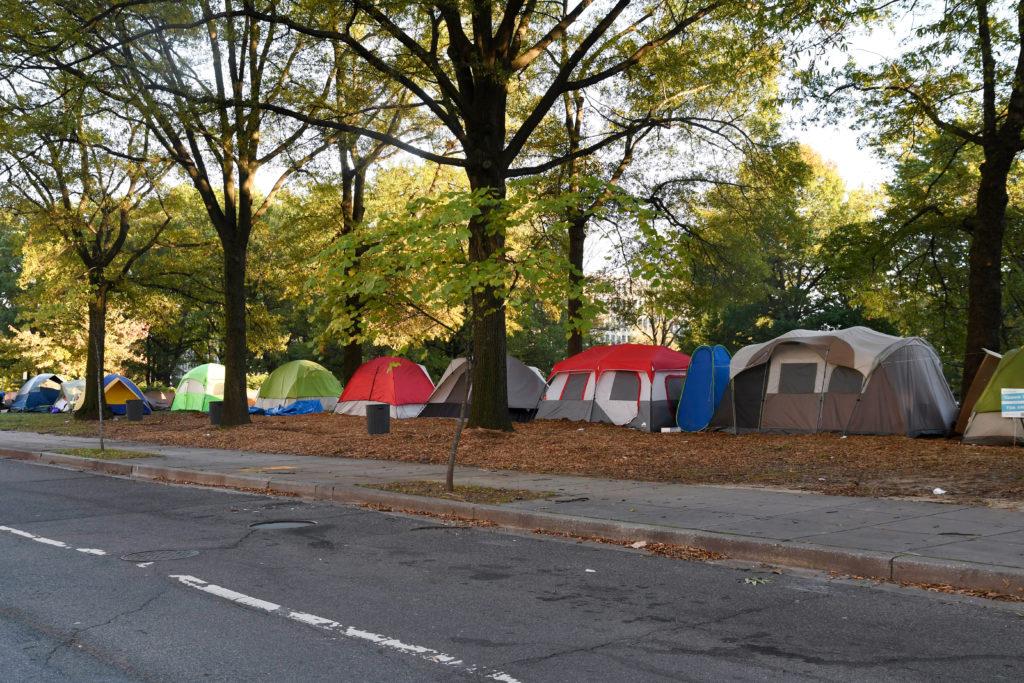Residents at the homeless encampment on E Street typically rely on social services and outreach groups for food and supplies, but road barriers and National Guard members stood in their way last week.
The encampment fell under the District’s green zone, a region where traffic was restricted to residents and businesses, as part of the Secret Service’s security operation to clamp down on public safety before the presidential inauguration. Local leaders said people experiencing homelessness faced a higher risk of criminal profiling and displacement by National Guard members, while nearby outreach groups struggled to provide their typical food, shelter and sanitation services.
Senior Yannik Omictin, a member of the Foggy Bottom and West End Advisory Neighborhood Commission, said inauguration security measures elevated the risk of criminalization for people experiencing homelessness who are “viewed with more suspicion” because National Guard troops are more vigilant for potential threats. One E Street encampment resident told Omictin he was followed by police officers and needed to explain that he was returning to his tent after shopping.
“There’s an increased suspicion because the groups that are here are looking for people who don’t belong or who are deviants,” Omictin said. “They automatically see unhoused folks and stereotype them as deviants, as people who don’t belong.”
DCist reported that 7,000 National Guard members will stay in D.C. following the inauguration, and 5,000 will remain in the city until March.
Workers with homeless outreach groups like Miriam’s Kitchen and Bread for the City said they feared that individuals experiencing homelessness might have been confronted by federal law enforcement or removed from secured areas if they were not in shelters or service centers downtown. Omictin said people experiencing homelessness face fear from both seeing troops stationed around them “at all times” and the possibility of displacement resulting from security measures.
He said Mayor Muriel Bowser had communicated in a flyer distributed by the Department of Human Services earlier this month that encampment residents could be displaced at any time, a scenario that would disrupt pathways to housing and that usually starts with the removal of a stable encampment. He added that U.S. Park Police personnel have also threatened displacement against homeless populations in the past.
“It is egregious, and a lot of these organizations operate with no real regard for the residents and people who live here,” Omictin said. “It’s really unsurprising that they’d be willing to take these kinds of measures, and that’s why I’m skeptical about the future. Without cynicism about the state of affairs in the short term, you risk putting a lot of peoples’ lives at danger.”
Omnictin said blocked-off roadways and National Guard troops demanding self-identification made it difficult for outreach groups, like Miriam’s Kitchen and Remora House, to reach those in need with food and sanitary products. He said social workers needed to spend extra time seeking entry at checkpoints because of the security restrictions in place.
He said it took 45 minutes for social workers to reach the E Street encampment and pass through a perimeter of Secret Service members and National Guard troops forming a “soft barricade” at 23rd Street.
Omictin said mobility restrictions and Metro station closures have deprived people experiencing homelessness of a “significant source of warmth” and the ability to travel to resource centers or case workers. He said these individuals often travel to the Downtown Day Services Center, where people can take showers, do laundry, get haircuts and practice for job interviews.
Even though security fencing and barriers were dismantled after Inauguration Day, Omictin said students should educate themselves about the District’s homeless services to understand their daily struggles. He said students should donate to organizations – like Ward 2 Mutual Aid, which assembles community fundraising – while urging local officials to fund permanent supportive housing and targeted affordable housing.
“There’s no excuse to not know what’s going on in our own backyard, and that’s the big message,” Omictin said.
ANC Commissioner Trupti Patel said she joined other commissioners and activists across the city in issuing Bowser a letter that demanded District officials provide temporary shelters for people experiencing homelessness following the Capitol riot and leading up to the inauguration. She said the homeless community was especially “susceptible” to violence tied to the Capitol mob.
“They had been in some cases harassed, bullied, name-called,” Patel said. “I just know many of the unhoused neighbors tried to find different areas that they could go to and some were even displaced from the normal areas that they felt safe to be at.”
After Patel helped pressure city officials with the letter and several online press conferences demanding homeless aid, she said the District launched an outreach program to temporarily move some residents of encampments into various shelters and hotel rooms.
Patel said the heightened security surrounding the inauguration blocked locals and volunteers from checking on those living on the street, as they would normally would.
“Many community members would make sure our unhoused neighbors got food, so there wasn’t this ability to consistently check in during the time of heightened security,” Patel said.
ANC Commissioner Joel Causey said he heard the Department of Human Services was planning to move people experiencing homelessness out of the green zone and into temporary shelters, adding that he noticed how certain encampment residents disappeared from the green zone leading up to the inauguration. He said officials planned to move some residents from E Street to Washington Circle to circumvent the security, but he isn’t completely sure of their current whereabouts.
“I unfortunately have seen people that were in the green zone aren’t there anymore, and that’s kind of concerning because I would like to know where they went,” he said.








